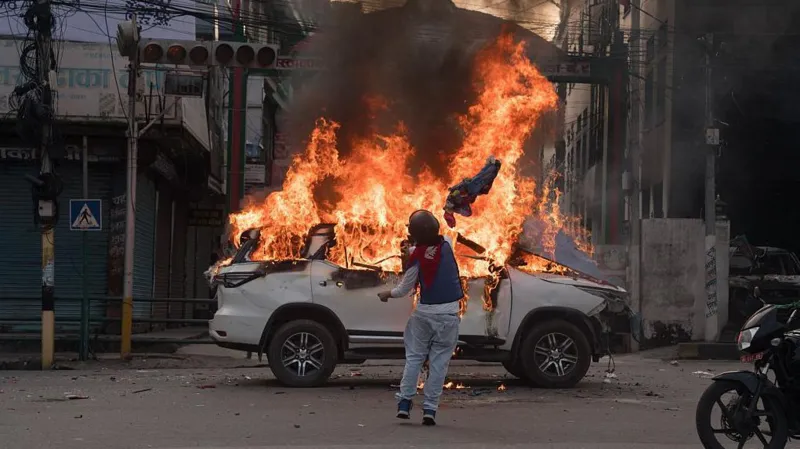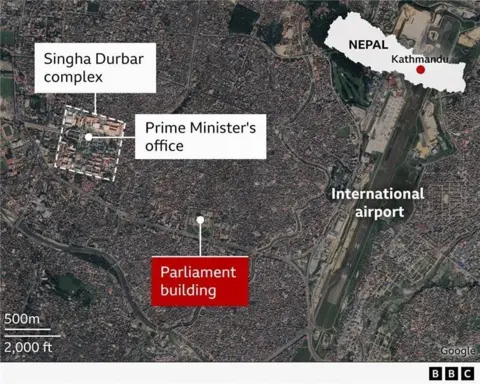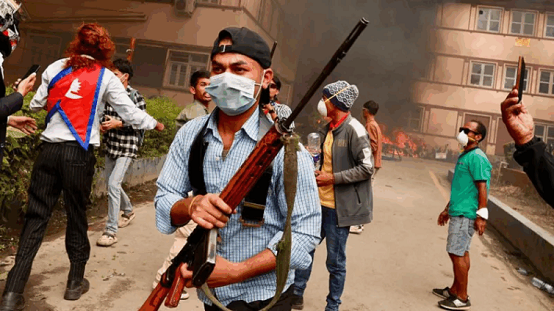Nepal's army has deployed patrols on the streets of the capital Kathmandu, as the Himalayan nation reels from its worst unrest in decades.
Fierce protests against corruption and nepotism spiralled into arson and violence on Tuesday. The prime minister resigned as politicians' homes were vandalised, government buildings torched and parliament set ablaze. Twenty-nine people have died since Monday.
But the "Gen Z" groups spearheading the protests distanced themselves from the destruction, saying it was "hijacked" by "opportunists".
On Wednesday, Kathmandu's airport reopened and the capital was relatively quiet as most residents obeyed a curfew, but smoke was still rising from burning buildings.
READ ALSO: Nepal's parliament set on fire after PM resigns over anti-corruption protest
The military, which is trying to control a spiralling situation, has invited the Gen Z protesters to engage in peace talks. Student leaders are consolidating a fresh list of demands, one of their representatives told the BBC.
Nationwide curfews are currently in place until Thursday morning and the army has warned of punishment for anyone involved in violence and vandalism. Twenty-seven people have been arrested over violence and lootings and 31 firearms have been found, it added.
There are now military checkpoints across the capital, where officers are checking the IDs of any vehicles passing through. One of the few sounds is their voices blaring through a loudspeaker, calling for people to stay at home: "No unnecessary travel".
Still, there are some young people out on the streets, carrying bin liners and wearing masks, cleaning up the damage caused by the protests.
Among them is Ksang Lama, 14, who didn't attend the protests, but is hopeful it will lead to change in Nepal.
"This corruption thing has been in Nepal since a very, very long time, and I think it is high time that the nation needs to change," she says. "I really hope that it can bring something positive to our country."
Another supporter of change - 24-year-old Parash Pratap Hamal, who took part in Tuesday's demonstrations - says he is now cleaning up because they had caused "a lot of pollution".
He believes Nepal "needs independent political figures" - he cites Kathmandu mayor Balendra Shah as someone who would make a good leader for the country.
"People are hopeful now - after this revolution," says 36-year-old Rakesh Niraula who lives in eastern Nepal. "There is hope for better governance... we feel like it was a lesson for leaders to improve themselves so the country can have a bright future."
Even as they welcomed the promise of change, some Nepalis tell the BBC the level of violence and vandalism that has come to illustrate the intensity of the protests took them by surprise.
"Personally I believe this shouldn't have happened," Mr Niraula says.
Prabhat Paudel, an entrepreneur who lives in the city of Lalitpur, said the burning of government buildings, such as the Supreme Court, "which is our own national wealth left me in shock".
But many protesters are worried that the movement has been co-opted by "infiltrators" - a claim that was echoed by the army.
"We are mainly in the process of controlling elements who are taking advantage of the situation to loot, set fires and cause various incidents," military spokesman Rajaram Basnet told the BBC.
A statement issued by protesters said, "our movement was and remains non-violent and rooted in the principles of peaceful civic engagement". They added that they were volunteering on the ground to "responsibly manage" the situation, safeguard citizens and protect public property.
They also said no further protests were scheduled from Wednesday onwards, and called on the military and police to implement curfews as necessary.

What led to the protests?
The demonstrations were ostensibly triggered by the government's decision last week to ban 26 social media platforms, including WhatsApp, Instagram and Facebook - but they have since grown to embody much deeper discontent with Nepal's political elite.
In the weeks before the ban, a "nepo kid" campaign, spotlighting the lavish lifestyles of politicians' children and allegations of corruption, had taken off on social media.
And while the social media ban was hastily lifted on Monday night, the protests had by that stage gained unstoppable momentum. Nineteen protesters were killed in clashes with police on Monday.
How did the violence escalate?
Those deaths fuelled the anger and unrest on Tuesday, when three more deaths were reported. Two police personnel also lost their lives, authorities say.
Protests continued unabated, with a crowd in Kathmandu torching the headquarters of the Nepali Congress Party, which is part of the governing coalition, and the house of its leader, Sher Bahadur Deuba, a former PM.
Hundreds of protesters also broke into and torched the parliament building, smashing windows and spray-painting anti-corruption graffiti on the walls.
The Singha Durbar, a large complex that houses government offices, was also stormed, and the Supreme Court on Wednesday announced that it had postponed all hearings of pending cases indefinitely due to severe damage.

Thousands of inmates escaped from prisons around Kathmandu in the chaos, local officials told BBC Nepali.
Five young inmates were killed late on Tuesday when security forces opened fire at escapees from a juvenile correctional facility in Banke, in western Nepal. According to a director at the prison, they were all under the age of 18.
What happens now?
The PM's resignation has left a leadership vacuum - but it's not clear who will replace him, or what happens next, with seemingly no-one in charge.
"Looking ahead, we believe Nepal's future leadership must be free from entrenched political party affiliations, fully independent, and selected on the basis of competence, integrity, and qualifications," the Gen Z protesters said in their statement on Tuesday.
"We demand a transparent and stable government that works in the interest of the people and not for the benefit of corrupt individuals or political elites," they added.
It is a sentiment that resonates with Taru Karki, a 40-year-old social worker in Kathmandu.
"There is deep anxiety and innocent young people have died," she says, adding that what the country now needs is peace and the end of corruption that brought so many people on to the streets in frustration.
"Enough is enough."
BBC





